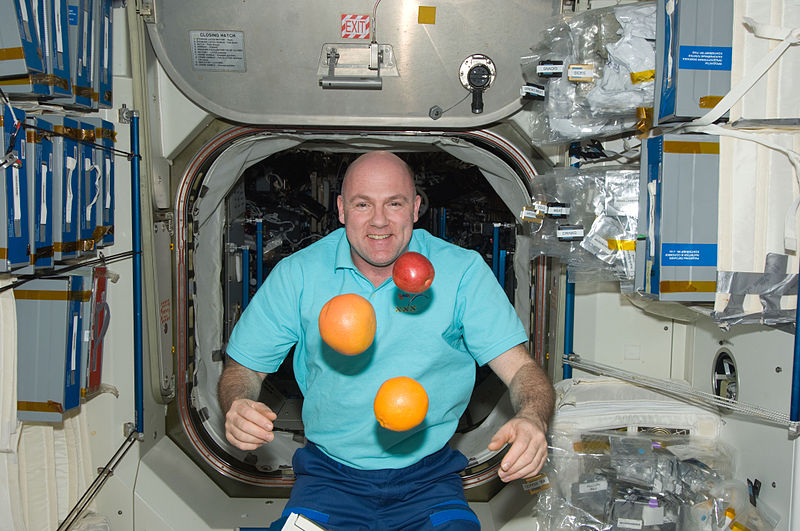A roundtrip to Mars will take 2,5 years. What does that mean for a space crew? At their symposium VSV Leonardo da Vinci offered the podium to a Dutchman who feels home at space: astronaut Andre Kuipers.
There is enough experience with people in space to predict that on such a long mission, the astronauts will suffer loss of weight (20 percent) of muscle force (50 percent) and of bone mass (up to 25 percent). “Basically you lose your bones through your urine”, explains Kuipers. Loss of body mass is inevitable, but must be countered by daily two-hour training sessions of running (leg muscles) and bicycling (cardiovascular training).
Dangers that a space crew faces are leaks, poisons and fires. “Note that you won’t see flames is space”, says Kuipers. All you’ll see is a blue haze around a wire. But it’s no less dangerous than outright flames.
And there is space radiation, from which we’re shielded by the Earth’s magnetic field. Astronauts on their way to Mars will have no such protection. It’s advisable to travel during a solar minimum. That’ll be around 2020 in a 11-year cycle. Another and better option altogether is to equip the spacecraft itself with a shielding magnetic field. Such concepts are still in very early stages.
The best people to send on such a long mission are handymen, says Kuipers. You will need technicians and medical trained people, but they will all need to learn each other’s skills. A doctor may need treatment as well. And as for all the equipment aboard: things will break down and will need mending. Regeneration units for water and oxygen are vital for the mission’s success, but they are known to break down. And how about the onboard toilets? There were two at the International Space Station, just to be sure. “A space mission without a toilet could be a great disaster”, Kuiper comments.
Last but not least, there’s the psychology. Astronauts have been known to suffer from sleep deprivation and become grumpy. The outcome of the Mars 500 experiment wasn’t very encouraging in this aspect. Nine men from different continents were confined to small living spaces in Moscow for 500 days to simulate a roundtrip to Mars. When they were released eight of them suffered from depression and lethargy and only one had remained active and joyful. It’s a huge challenge to keep people active during such a trip, says Kuipers.
People need a niche of their own with photos, music and perhaps even plants, says Kuipers. They also need to celebrate each possible occasion, make music, relax and enjoy a good atmosphere. Perhaps by juggling around with balls. Kuipers remembers the entire ISS crew floating around a movie-playing laptop on their Friday movie nights.
At least from the ISS, you could always see Earth. You could phone home and mail with friends. Nu such luxury on a Mars mission. From that distance, Earth is just a pale blue dot.
One day we will visit Mars, Kuipers assured his audience in the TU Aula. But in the meantime a lot of new technology and bright ideas are needed to which the students at the symposium may contribute.
Read more about the Planetary Exploration symposium.



Comments are closed.